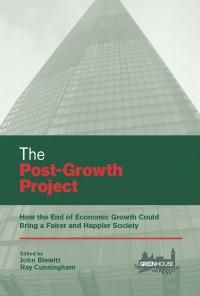
The Post-Growth Project: How the End of Economic Growth Could Bring a Fairer and Happier Society
This book challenges the assumption that it is bad news when the economy doesn’t grow.

Published by the London Publishing Partnership
For decades, it has been widely recognized that there are ecological limits to continuing economic growth and that different ways of living, working and organizing our economies are urgently required. This urgency has increased since the financial crash of 2007–2008, but mainstream economists and politicians are unable to think differently. The authors of this book demonstrate why our economic system demands ecologically unsustainable growth and the pursuit of more ‘stuff’. They believe that what matters is quality, not quantity – a better life based on having fewer material possessions, less production and less work. Such a way of life will emphasize well‑being, community, security and ‘conviviality’. That is, more real wealth. The book will therefore appeal to everyone curious as to how a new post‑growth economics can be conceived and enacted. It will be of particular interest to policy makers, politicians, businesspeople, trade unionists, academics, students, journalists and a wide range of people working in the not-for-profit sector. All of the contributors are leading thinkers on green issues and members of the think‑tank Green House.
John Blewitt is a Distinguished Fellow of the Schumacher Institute. He is author of Media, Ecology and Conservation (Green Books, 2010), Understanding Sustainable Development (second edition, Earthscan, 2014) and co-author of Sustainable Business (Earthscan, 2014). A sociologist by training, he currently works at Aston Business School. Ray Cunningham is a freelance writer, speaker, translator and consultant on British–German knowledge exchange, mainly in the area of sustainability. He is the former director of the Anglo-German Foundation for the Study of Industrial Society and joint founder and convenor of the British–German Environment Forum.
The contributors are Molly Scott Cato, Andrew Dobson, Jonathan Essex, Brian Heatley, Andrew Pearmain and Rupert Read.
This book can be ordered (postage free) here.
Professor Tim Jackson, Author of 'Prosperity Without Growth - Foundations for the Economy of Tomorrow':
"With ‘The Post-Growth Project’, Green House has made a significant contribution to questioning the belief that all economic policy must be governed by the objective of growth. The Project points towards a new way of thinking about how to achieve the fundamental social goals we all share."
Richard Murphy, Tax Justice Network:
"All progress is dependent upon awkward questions being asked about supposedly accepted truths. That is what the Green House team did in 'The Post-Growth Project' and the world is a better place because they did."



